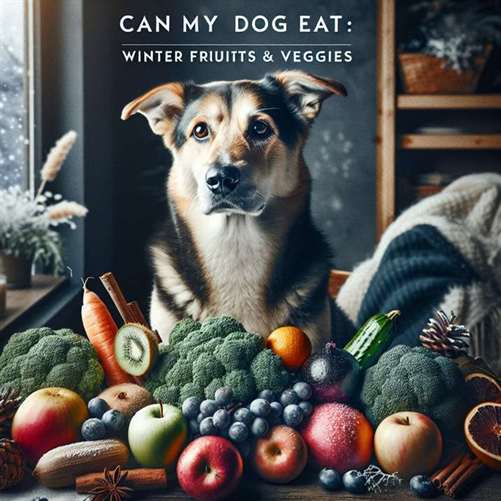Can My Dog Eat: Winter Fruits & Veggies
Introduction
Did you know that dogs have taste buds that can distinguish between sweet and bitter flavors, just like us? This means they can enjoy a variety of foods, including winter fruits and vegetables! As the temperature drops and seasonal produce changes, many pet owners wonder, “Can my dog eat: winter fruits & veggies?” This question is crucial for maintaining a balanced and healthy diet for our furry friends.
In recent years, the trend of incorporating more fruits and vegetables into dog diets has gained popularity. Studies have shown that these natural foods can provide essential vitamins and minerals, contributing positively to dog health. This article dives into the safety, benefits, and types of winter fruits and veggies that are suitable for dogs.
As you read on, consider this: Are you maximizing the nutritional potential of your dog’s meals by including seasonal produce? By the end of this article, you’ll be equipped with the knowledge to make informed dietary choices for your pup.
For more insights into pet nutrition, make sure to explore more about dog-friendly foods.
What is Can My Dog Eat: Winter Fruits & Veggies?
Definition
Can My Dog Eat: Winter Fruits & Veggies refers to the inquiry surrounding the safety and nutritional value of various fruits and vegetables that are in season during the winter months. These food items can offer a plethora of health benefits for dogs, including high levels of vitamins, minerals, and antioxidants.
Historical Context
Historically, the inclusion of winter fruits and vegetables in dog diets has evolved significantly. In the past, most pet foods were primarily meat-based, reflecting the belief that dogs are carnivores. However, as our understanding of pet nutrition has advanced, there has been a shift towards recognizing the benefits of a more varied diet. The raw feeding movement, in particular, has highlighted the advantages of natural foods, encouraging pet owners to enrich their dogs’ diets with healthy fruits and vegetables.
The Importance of Can My Dog Eat: Winter Fruits & Veggies
The relevance of this topic has heightened due to the growing awareness surrounding holistic pet care. Many pet owners are now seeking ways to provide their dogs with a more balanced diet that includes natural, whole foods. Incorporating winter fruits and veggies not only enhances the nutritional profile of a dog’s meals but also introduces new flavors and textures, making mealtime more enjoyable.
Can My Dog Eat: Winter Fruits & Veggies in the Context of Pet Nutrition
Incorporating seasonal produce into your dog’s meals can significantly impact their overall health. For instance, some fruits and vegetables are rich in dietary fiber, which aids digestion, while others are packed with antioxidants that help combat inflammation and support the immune system.
Key Players or Contributors
Several organizations and experts in pet nutrition have contributed to the understanding of how fruits and vegetables can benefit dogs. Veterinary nutritionists, pet food manufacturers, and holistic pet care advocates have all played a role in promoting the idea that dogs can thrive on a diet that includes a variety of foods beyond meat.

How Does Can My Dog Eat: Winter Fruits & Veggies Work?
The Mechanics of Can My Dog Eat: Winter Fruits & Veggies
Integrating winter fruits and veggies into your dog’s diet can be done in several ways. Here are some practical steps to consider:
- Start Small: Introduce one new fruit or vegetable at a time to monitor for any adverse reactions.
- Preparation: Always wash and prepare fruits and vegetables by removing seeds, pits, and toxic parts. For instance, while apples are safe, the seeds can be harmful.
- Cooking: Some vegetables, like sweet potatoes and carrots, can be cooked to enhance digestibility. Steaming is a great method that retains nutrients.
- Mixing: Blend fruits and vegetables into your dog’s regular food or serve them as a treat.
Technological Foundations of Can My Dog Eat: Winter Fruits & Veggies
The rise of pet nutrition technology has also played a role in understanding how to incorporate these foods safely and effectively. Nutritional analysis tools have become available for pet owners, helping them understand the nutritional content of various foods. This technology enables you to make informed decisions about your dog’s diet, ensuring they receive balanced nutrition year-round.
Benefits of Feeding Dogs Winter Fruits & Veggies
Nutritional Advantages
The nutritional benefits of incorporating winter fruits and veggies into your dog’s diet are numerous:
- Vitamins and Minerals: Many fruits and vegetables are rich in essential vitamins like A, C, and E, which support skin health, immune function, and overall vitality.
- Antioxidants: Foods such as cranberries and blueberries are high in antioxidants, which can help reduce oxidative stress and lower the risk of chronic diseases.
- Fiber: Vegetables like broccoli and carrots provide fiber, aiding in digestion and promoting a healthy gut.
Enhanced Hydration
During the winter months, dogs may become dehydrated, especially if they are less active. Many fruits and vegetables have high water content, which can help keep your dog hydrated. For example, watermelon and cucumber are excellent choices for hydration.
Weight Management
Incorporating low-calorie fruits and vegetables into your dog’s diet can assist in weight management. If your pup is prone to winter weight gain, adding these foods can help them feel full without adding excess calories.
Types of Winter Fruits & Veggies Safe for Dogs
When considering winter fruits and veggies, it’s essential to know which ones are safe and beneficial for dogs. Here are some top choices:
Safe Winter Fruits
- Apples: Remove the seeds and core before feeding.
- Cranberries: These can be offered fresh or dried; however, limit serving sizes.
- Pumpkin: A great source of fiber and vitamins; use plain pumpkin puree.
Safe Winter Vegetables
- Carrots: Raw or cooked, carrots are a crunchy treat that dogs love.
- Sweet Potatoes: Cooked sweet potatoes are nutritious and delicious.
- Green Beans: These are low in calories and high in fiber.
Caution with Certain Foods
While many winter fruits and vegetables are safe, some can be harmful. Avoid giving your dog foods like:
- Onions and Garlic: These can be toxic to dogs.
- Grapes and Raisins: These can cause kidney failure in dogs.
- Avocado: Contains a toxic compound called persin.
How to Introduce Winter Fruits & Veggies to Your Dog’s Diet
Step-by-Step Guide
- Research: Before introducing any new food, research its safety and benefits for dogs.
- Preparation: Wash, peel, and chop the fruits and vegetables into bite-sized pieces.
- Mixing: Combine small amounts with your dog’s regular food to help them acclimate.
- Monitoring: Watch for any signs of allergies or digestive issues after introducing new foods.
Suggested Serving Sizes
- Small Dogs: 1-2 small pieces of fruit or 1/4 cup of veggies per serving.
- Medium Dogs: 2-3 small pieces of fruit or 1/2 cup of veggies.
- Large Dogs: 3-4 small pieces of fruit or 1 cup of veggies.
Potential Risks and Considerations
Allergies and Sensitivities
Just like humans, dogs can have allergies or sensitivities to certain foods. Always introduce new items slowly and observe your dog for any adverse reactions.
Overfeeding
While fruits and vegetables are healthy, they should only make up a small portion of your dog’s overall diet. Overfeeding can lead to digestive upset or weight gain.
Consultation with a Veterinarian
Before making significant changes to your dog’s diet, it’s wise to consult with your veterinarian. They can provide personalized advice based on your dog’s specific health needs and conditions.
Future Trends in Can My Dog Eat: Winter Fruits & Veggies
As pet nutrition continues to evolve, we can expect to see:
- Increased Awareness: More pet owners will seek information about the benefits of seasonal produce for their dogs.
- Innovative Products: Pet food manufacturers may develop products that include winter fruits and veggies, catering to health-conscious consumers.
- Holistic Approaches: The trend towards holistic pet care will likely grow, with a focus on whole, natural ingredients.
Conclusion
In conclusion, the question “Can my dog eat: winter fruits & veggies?” is an important consideration for pet owners looking to enhance their dog’s diet. Incorporating a variety of safe, seasonal produce can provide numerous health benefits, from improved nutrition to hydration and weight management.
As you explore new food options for your canine companion, remember to introduce them gradually and consult with your vet if you have any concerns. By doing so, you’ll ensure that your dog enjoys a healthy, balanced diet that includes the best winter fruits and vegetables.
So, as winter approaches, take the time to experiment with safe fruits and veggies for your furry friend. Not only will they enjoy the new flavors, but you’ll also be contributing to their overall well-being.
For
Resource Links:
- reddit.com: … Plant only things that you eat the fruit of or the greens (not the … You can compost the feces but NOT into your food. Must be …
- iandloveandyou.com: … Explore dog safe fruits and veggies perfect for winter snacking. Learn which vegetables are good for dogs and keep your pup happy and …
- reddit.com: … So your parrots are getting correct nutrition, like your dog would get from dog … They also eat fresh vegetables daily and have …




0 Comments